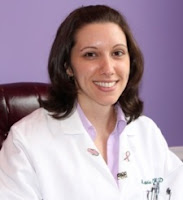Breast cancer is the second leading cause of cancer death in
women. 1 in 8 women in the United States will develop
breast cancer. Most cases of breast
cancer are sporadic with only 5-10% of cases have a genetic link. Therefore, it
is important for women to perform their self- breast examinations monthly, have
a breast exam by a health care provider yearly as well as yearly mammography screening. Early warning signs of breast cancer are new
lump or changes in breast tissue or skin.
There is no cause but lifestyle modification can help reduce risks.
These risks include low fat diet, exercise, avoiding alcohol and smoking.
Early detection saves lives. Nearly 70 percent of all breast cancers are found through self-exams; with early detection, the five-year survival rate is 98 percent. The National Breast Cancer Foundation has an a 60-second online tool for helping remind you to perform your breast self-exam, schedule your clinical breast exam, and get your mammogram as needed.
As a woman, a mother and health care
professional, I will continue to work diligently to educate women about how to perform self- breasts examinations and to educate
their family and friends about raising
awareness. You can help save lives by joining a fundraiser, show support by
donating, join the Avon Walk or purchase merchandise from the Susan G. Komen
foundation. October is Breast Cancer Awareness Month please make a difference!
Outsourced Storks
Offering advice for women in every stage of family planning. The go-to place for advice, knowledge and information you may need to know about keeping yourself healthy as a woman!
Tuesday, October 1, 2013
Monday, September 9, 2013
Preparing For Your Delivery!
Obstetrical patients are best served if
served if they are well prepared for their delivery experience.
Long Island Jewish Medical Center offers a prepared childbirth
course along with classes on breastfeeding, child care and CPR. This class
should be taken in the mid third trimester. It includes information on when to
call your OB about labor, when to go to the hospital and what happens at the
hospital.
Garden Ob/Gyn recommends that all patients obtain a copy
of their prenatal reports to bring to the hospital with them (just in case the faxed medical
record can’t be found). We also like all of our patients to take a hospital tour at 32 weeks. Its important to familiarize yourself with the hospital grounds, parking and visitation rules before you give birth!
Preparation is essential in
having a smooth, well controlled birthing experience.
Geno Manna, M.D.
Friday, August 30, 2013
An Easy Guide to HPV by Dr. Maria Culotta
What is HPV?
o A very
common infection that infects the
genital and anal skin.
o Over 100 types, low and high risk.
o Low
risk HPV is
responsible for genital warts.
o High
risk HPV increases your
risk for cervical cancer if not found in time.
o Most infections don’t cause anything and
your immune system clears it in a few months, but HPV can persist for a few
years.
o If HPV doesn’t clear, it can increase
your risk for developing cervical cancer.
Why did I get HPV?
o Sexually transmitted
o Very common infection! Means that you have a common virus that usually
clears from the body without having any issues.
o It is not unusual for HPV to be
diagnosed in a long-term relationship!
What
is a pap smear?
o Screening test looking for abnormal
changes in your cells in the cervix before they turn into cancerous cells.
o Small brush is used to swab cervical
cells and it is sent to lab for evaluation.
When should I get a pap smear?
o ACOG recommends no earlier than 21
years of age.
o Usually once a year, but new
guidelines are available based on new research, so please discuss with
healthcare provider.
o Can refer to ASCCP.ORG
What
is HPV testing? Is it the same as a
pap smear?
o Not the same as a pap smear. It specifically looks for HPV infection.
o It is done as a co-test for women 30
years of age and older, and as followup for abnormal cells on a pap smear.
Why
isn’t HPV tested in women under 30 years
of age?
o HPV is very common in younger women and
will most likely to be cleared naturally.
What
is HPV genotyping?
o Useful to see who is infected with “High risk” HPV infection that may
increase risk of cervical cancer.
o Important types are 16 and 18, which are found most with
cervical cancer.
What
happens if my pap is abnormal?
o Depends on severity of Pap. You may need to simply repeat it more often.
o If more extensive changes and “high
risk” HPV positive, you will need in-office procedure: COLPOSCOPY. Special
microscope is used to closely examine cervix and biopsies are taken.
What
if I need treatment?
o Mild cervical changes can be monitored
because your immune system can naturally clear the infection. Helpful hints to help clear the HPV
infection: Take your daily vitamins, stop smoking if you are and decrease your
stress level!
o Moderate and
severe infection are usually treated
and treatment depends on age, if pregnant, and where cells changes are located.
o Treatment options: cryosurgery (freezing),
laser, LEEP (thin, electrically charged wire to cut away abnormal cells), cone
biopsy (surgical knife to cut away cells)
What
about HPV vaccine?
o CDC recommends routine HPV vaccination
for males and females age 11-26 years of age
o Makes it much less likely a woman will
develop cervical cancer or have precancerous cervical cell changes.
Subscribe to:
Posts (Atom)


